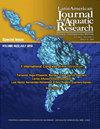Ractopamine supplementation in diets for Nile tilapia (Oreochromis niloticus) at grow-out phase: effect on body composition and fatty acid profile
IF 0.8
4区 农林科学
Q3 FISHERIES
Latin American Journal of Aquatic Research
Pub Date : 2023-04-30
DOI:10.3856/vol51-issue2-fulltext-2969
引用次数: 0
Abstract
Ractopamine is a drug used as an additive in animal production to improve growth, body composition, and production efficiency, although its use in fish is still poorly known. This study aimed to evaluate ractopamine hydrochloride (RAC) effects at increasing levels (0, 10, 20, and 40 mg kg-1) in Nile tilapia (Oreochromis niloticus) diets during 40 days by considering growth performance, body composition, and muscle fiber morphometry. One hundred and twelve fish (mean initial weight 518.63 ± 5.49 g) were housed in 16 circular tanks (450 L), following a completed randomized design with four treatments and four replicates. Body composition was significantly affected (P < 0.05), and the content of lipids in fish fillets dropped 26.7% (20 mg kg-1 RAC) and 26.1% (40 mg kg-1 RAC), as well as the amount of unsaturated fatty acids C14:0 and C18:0 in fish fillets (P < 0.05) by treatment with 10 mg kg-1 of RAC. Results demonstrate that fish fed 20 mg kg-1 RAC for 40 days changed Nile tilapia fillet chemical composition, decreasing lipid levels, altering the fatty acid profile, and increasing protein levels. RAC did not affect any productive performance parameters evaluated for muscle fiber morphometry.尼罗罗非鱼生长期饲粮中添加莱克多巴胺:对其体成分和脂肪酸分布的影响
莱克多巴胺是一种用作动物生产添加剂的药物,用于促进生长、改善身体组成和提高生产效率,尽管它在鱼类中的用途仍然鲜为人知。本研究旨在通过考虑尼罗罗非鱼(Oreochromis niloticus)的生长性能、体成分和肌纤维形态测定,评估在40天的时间里,添加不同水平(0、10、20和40 mg kg-1)盐酸莱克多巴胺(ractopamine hydrochloride, RAC)对尼罗罗非鱼(Oreochromis niloticus)饲料的影响。试验采用4个处理、4个重复的完全随机设计,将12尾鱼(平均初始体重518.63±5.49 g)放入16个450 L的圆形池中。10 mg kg-1 RAC对鱼体组成有显著影响(P < 0.05),鱼片脂质含量降低26.7% (20 mg kg-1 RAC)和26.1% (40 mg kg-1 RAC),鱼片中不饱和脂肪酸C14:0和C18:0含量降低(P < 0.05)。结果表明,20 mg kg-1 RAC饲喂40 d后,尼罗罗非鱼鱼片的化学成分发生变化,脂肪含量降低,脂肪酸谱发生改变,蛋白质含量升高。RAC不影响肌纤维形态测量评估的任何生产性能参数。
本文章由计算机程序翻译,如有差异,请以英文原文为准。
求助全文
约1分钟内获得全文
求助全文
来源期刊

Latin American Journal of Aquatic Research
FISHERIES-MARINE & FRESHWATER BIOLOGY
CiteScore
1.70
自引率
10.00%
发文量
44
审稿时长
4-8 weeks
期刊介绍:
Latin American Journal of Aquatic Research- LAJAR is the continuation of the journal Investigaciones Marinas (1970-2007) and is published since 2008 by the Escuela de Ciencias del Mar, Facultad de Ciencias del Mar y Geografía of the Pontificia Universidad Católica de Valparaíso. LAJAR is an “Open Access” journal that publishes in English language, original research articles, reviews and short communications on aquatic science, which contain the results of research conducted in aquaculture or in oceanic and coastal marine waters of Latin America.
The following topics are considered: Physical Oceanography, Chemical Oceanography, Marine Biogeochemistry, Marine Pollution and Toxicology, Marine Geology and Geophysics, Biological Oceanography, Fisheries and Aquaculture.
 求助内容:
求助内容: 应助结果提醒方式:
应助结果提醒方式:


